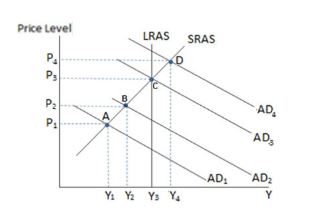The Keynesian perspective on the effect of an increase in taxes is that this policy action
A) generates reductions in consumption and in saving.
B) generates reductions in consumption and an increase in saving to pay for the new taxes.
C) has no impact on consumption.
D) increases current consumption and reduces future consumption.
Answer: A) generates reductions in consumption and in saving.
You might also like to view...
You are part of a local community theater group. It is the goal of the group to increase the amount of revenue earned through ticket sales. Mary says the obvious solution is to increase ticket prices. Is Mary correct?
A. Mary is correct if the demand for tickets is price inelastic. B. Mary is incorrect if the demand for tickets is price inelastic. C. Mary is correct. The increase in ticket prices will always increase revenue. D. Mary is incorrect. The increase in ticket prices will never increase revenue.
If the economy in the graph shown were at point B, and the government wished to bring the economy back to its long-run equilibrium, it might:

A. increase government spending.
B. increase income tax.
C. decrease tax credits.
D. All of these would move the economy to its potential GDP from point B.